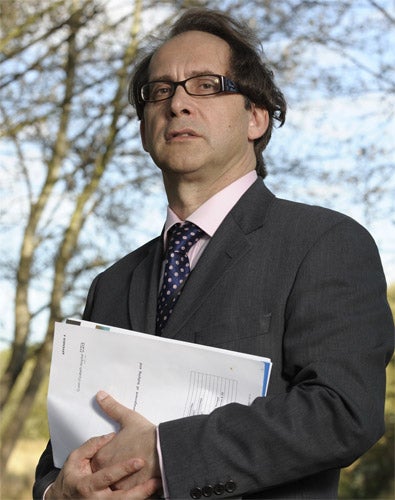Damages win for consultant who criticised cost-cutting
Whistleblower was suspended by hospital after raising safety concerns

Your support helps us to tell the story
From reproductive rights to climate change to Big Tech, The Independent is on the ground when the story is developing. Whether it's investigating the financials of Elon Musk's pro-Trump PAC or producing our latest documentary, 'The A Word', which shines a light on the American women fighting for reproductive rights, we know how important it is to parse out the facts from the messaging.
At such a critical moment in US history, we need reporters on the ground. Your donation allows us to keep sending journalists to speak to both sides of the story.
The Independent is trusted by Americans across the entire political spectrum. And unlike many other quality news outlets, we choose not to lock Americans out of our reporting and analysis with paywalls. We believe quality journalism should be available to everyone, paid for by those who can afford it.
Your support makes all the difference.A senior consultant at a London hospital who was suspended after repeatedly raising concerns about the health and safety of patients has a won a landmark claim.
Ramon Niekrash, 50, a consultant urologist at the Queen Elizabeth Hospital in Woolwich, south-east London, was branded a "troublemaker" and excluded from the hospital in 2008 after writing a series of letters to management warning about the impact of chronic cost-cutting.
But an employment tribunal has ruled that Mr Niekrash was acting as a whistleblower in the public interest and is entitled to substantial damages from the hospital.
The case raises important questions about the lack of protection for NHS staff who wish to bring health and safety failings to the attention of senior management. Last night, Mr Niekrash's lawyers said the treatment of their client showed how senior whistleblowers working for the NHS are being victimised for speaking out.
The judges also blamed government NHS targets for adding to the damaging tensions between management and senior medical staff at the hospital.
In his evidence to the tribunal in Croydon, Mr Niekrash complained that the reduction of specialist nurses and closure of the specialist urology ward was detrimental to the care of patients. On 18 March 2009, just before his suspension, he wrote a letter stating that the delayed review of cancer patients meant they had a "very good case of negligence against the trust".
In another letter, he accused the hospital's management of having the attitude of a "plantation owner" in their treatment of the doctors. The tribunal was told that the management's reaction to the letters was to dismiss him as "vexatious" and "awkward".
In one instance it was alleged that a senior doctor at the hospital said she wished that the Australian-trained consultant was "in chains on a plane in Heathrow back to Australia".
The unanimous 50-page employment tribunal ruling found that Mr Niekrash's treatment, specifically his exclusion from the hospital, was in breach of whistleblowing legislation.
Judge Burton, sitting at the tribunal, said: "We have no doubt that the exclusion of a consultant, being a rare occurrence, must have an adverse impact on the claimant's [Mr Niekrash's] reputation... We accept that the claimant has been hurt by the exclusion and that his health has suffered."
On the Government's target-setting, the judge said: "What is immediately apparent is that there has been a tension between the professional desire of the claimant and his consultant colleagues to provide a good quality urology service for the patients and the requirement of management to reduce or limit costs and also comply with varying targets laid down by the Department of Health from time to time."
He added: "The difference between the parties will have to be resolved by the restoration of a proper working relationship which will require goodwill on both sides."
Arpita Dutt, employment specialist with law firm Russell Jones & Walker, who represented Mr Niekrash, said: "The decision to exclude Mr Niekrash was exceptional and unjustified and has had an ongoing adverse impact on his reputation, practice and his health, and we are delighted that the tribunal's judgment reflects this.
"In the wake of further cuts to public services, including the health service and the likely increase in such tensions, it is hoped that employers won't resort to similar silencing measures against employees who raise legitimate public interest concerns," she warned.
A spokesman for the hospital said: "We are considering this judgment very carefully. These incidents covered in this case took place prior to the establishment in April 2009 of South London Healthcare NHS Trust, which now manages the Queen Elizabeth Hospital. There are nearly always lessons to be learned from cases like this, and as soon as we have carefully considered the judgment, we will respond in full."
Join our commenting forum
Join thought-provoking conversations, follow other Independent readers and see their replies
Comments